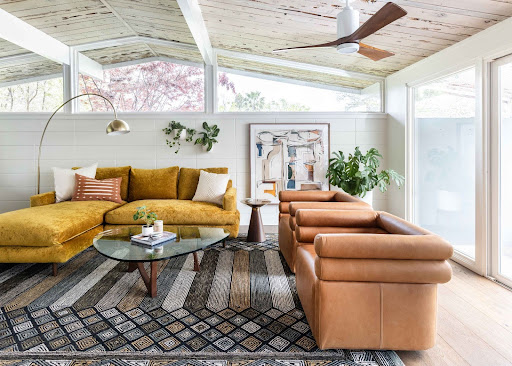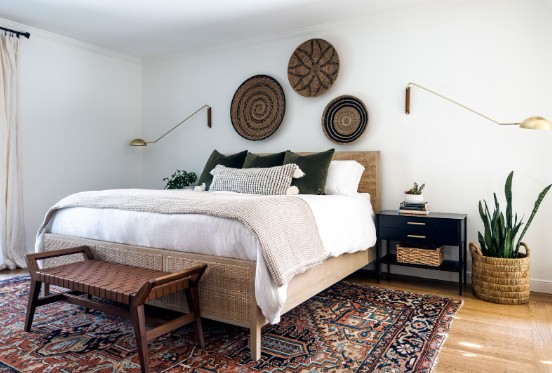Sustainable Interior Design: Create a Beautiful Home That’s Good for You and for the Planet
Sustainable interior design is about more than just being “eco-friendly.” It’s also about creating a home that’s healthier, more comfortable, and built to last. Whether you’re getting ready to sell, settling into a new home, or just looking to make some thoughtful upgrades, sustainable choices can have a big impact on both you and the planet. And the best part? Many of these changes can save you money in the long run, too.
Choose Healthier Materials
The materials you bring into your home make a big impact on your indoor air quality. Making mindful choices doesn’t mean sacrificing style. It just means being a little more intentional about what you put into your space.

Photo Courtesy of Kat Alves
- Avoid Toxic Paint: Traditional paints can release nasty chemicals like benzene and acetone into the air. Low or no-VOC paints are a much healthier option, and they look just as great.
- Pick Natural Materials: Synthetic fabrics & rugs also contribute to indoor air pollution. Instead, consider natural materials like responsibly sourced cotton & wool, or look for certified non-toxic labels like GreenGuard and OEKO-TEX.
- Go for Solid Wood: When you’re buying new furniture, cabinets, or flooring, solid wood is a better choice than MDF or laminate, which can contain formaldehyde-based adhesives.
- Add Some Life with Houseplants: Houseplants bring life and texture to any space while purifying your air from harmful toxins.
Make Your Home More Efficient
You don’t need to install solar panels to make your home more energy-efficient (although those are a great idea, too!). Small design changes can make a big difference in how much energy your home uses—while keeping it cozy and stylish.

Photo by Kat Alves Photography
- Maximize Natural Light: Arrange mirrors to reflect sunlight, opt for sheer curtains where privacy isn’t needed, and use lighter paint colors to brighten your space without flipping a switch.
- Switch to LED Bulbs: LEDs use a fraction of the energy of traditional bulbs and last way longer. Plus, they now come in warm, natural-looking tones, rather than the harsh blue light of early LEDs.
- Use Sustainable Insulation: If you’re opening up walls for a renovation, consider recycled or natural insulation materials to improve efficiency while keeping things eco-friendly.
- Install Window Treatments: Curtains or window shades can help to keep your home warmer in the winter and cooler in the summer, reducing your heating and cooling costs.
- Switch to Efficient Fixtures: If you’re replacing kitchen or bathroom fixtures, look for energy-efficient appliances and water-saving faucets and showerheads. You won’t even notice a difference in performance!
- Upgrade to Energy-Efficient Windows & Doors: Yet another way to reduce your heating & cooling bills. Solid core doors, double or triple-pane windows, and well-sealed openings can help a ton.
Reduce Waste Where You Can
The pieces you choose to furnish your home can have sustainability impacts, too. Luckily, it’s not hard to decorate in a way that feels like “you” while being mindful of waste and materials.

Photo Courtesy of Leah Connolly
- Shop Vintage & Secondhand: Older furniture is often higher quality and more unique than mass-produced pieces. Plus, giving something a second life keeps it out of the landfill!
- Invest in Quality Over Quantity: Well-made furniture lasts longer, meaning fewer replacements over time. It might involve a higher upfront cost, but you won’t have to shell out as often.
- Flexibility with Your Layout: Instead of built-in furniture that might limit your uses of the space, opt for freestanding pieces that make spaces adaptable over time.
- Donate or Recycle: Before tossing old fixtures and furniture, see if they can be donated locally. Many construction materials, like wood, tile, cabinetry, and even drywall, can also be repurposed or salvaged.
Final Thoughts
Sustainable design doesn’t mean compromising on style, it just means making intentional choices that are better for you, your home, and the environment. Whether it’s as simple as swapping out a lightbulb or as big as renovating your space with eco-friendly materials, every sustainable step makes a difference.
The best place to start? Pick one small change today and see where it takes you. You might be surprised at how easy (and rewarding) it is to create a home that’s both beautiful and better for the planet!
Meet Leah Connolly of Studio Connolly

Photo Courtesy of Mayumi Acosta Photography
Leah Connolly is the founder of Studio Connolly, an award-winning interior design firm based in Sacramento, CA. As a Certified Interior Designer (CID) and LEED Green Associate, Leah specializes in creating vibrant, sustainable homes that prioritize both beauty and well-being. She partners with eco-conscious vendors and contractors, and incorporates thoughtful, low-impact materials to design spaces that are functional, inviting, and better for the planet.
Studio Connolly
2716 Avalon Drive
Sacramento, CA 95821
leah@studioconnolly.com
www.studioconnolly.com
Instagram: @studioconnolly
Category Home Inspiration
Windermere Signature Properties
With the California Local blog, Windermere Signature Properties strives to deliver the most valuable information to both home buyers and sellers while highlighting our favorite local gems that make Sacramento the best place to live in California. DRE# 00182401

